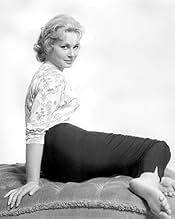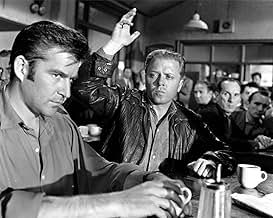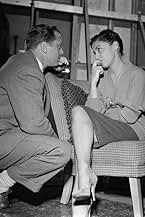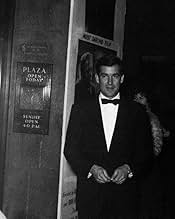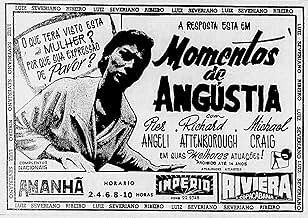PUNTUACIÓN EN IMDb
7,2/10
1,8 mil
TU PUNTUACIÓN
Añade un argumento en tu idiomaA young factory worker decides to stand up against his workmates and fellow union members when they want to hold a wildcat strike.A young factory worker decides to stand up against his workmates and fellow union members when they want to hold a wildcat strike.A young factory worker decides to stand up against his workmates and fellow union members when they want to hold a wildcat strike.
- Dirección
- Guión
- Reparto principal
- Nominado para 1 premio Óscar
- 6 premios y 6 nominaciones en total
Reseñas destacadas
Guy Green's (1960) film of Bryan Forbes' screenplay is based on a treatment by Michael Craig and, brother, Richard Gregson. Set in London in the late 1950's it was the first release of the joint venture production company Beaver Films set up by Bryan Forbes and Richard Attenborough.
As the film opens, we join Tom Curtis (Richard Attenborough) at work in a small engineering factory beset with labour problems. Single-minded and fiercely independent, Curtis is slow to grasp the implications of the fomenting unrest among his workmates as they band together to challenge the management head-on in a dispute that ultimately leaves Curtis out in the cold.
We follow Curtis home at night where his workmate Joe Wallis (Michael Craig - also writer) lodges with Curtis, his wife Anna (Pier Angeli) and their young family.
But as industrial relations deteriorate at work we see Curtis becoming increasingly isolated and intimidated by his determined colleagues.
With solid performances from Bernard Lee (Bert Connolly), Geoffrey Keen (Davis) and Alfred Burke (Travers) as the sinister agitator, the audience sees Curtis left high and dry as even the management feel compelled to abandon him.
Increasingly out of his depth, we are drawn into Curtis' worsening situation as his family are also intimidated in an effort to break his indomitable will.
This film captures something of the early struggle for recognition by employees in small firms like this before employment protection became enshrined in the law of the land. It gives us a feel for the situation of the casualties along the way and the forces at play.
As the film opens, we join Tom Curtis (Richard Attenborough) at work in a small engineering factory beset with labour problems. Single-minded and fiercely independent, Curtis is slow to grasp the implications of the fomenting unrest among his workmates as they band together to challenge the management head-on in a dispute that ultimately leaves Curtis out in the cold.
We follow Curtis home at night where his workmate Joe Wallis (Michael Craig - also writer) lodges with Curtis, his wife Anna (Pier Angeli) and their young family.
But as industrial relations deteriorate at work we see Curtis becoming increasingly isolated and intimidated by his determined colleagues.
With solid performances from Bernard Lee (Bert Connolly), Geoffrey Keen (Davis) and Alfred Burke (Travers) as the sinister agitator, the audience sees Curtis left high and dry as even the management feel compelled to abandon him.
Increasingly out of his depth, we are drawn into Curtis' worsening situation as his family are also intimidated in an effort to break his indomitable will.
This film captures something of the early struggle for recognition by employees in small firms like this before employment protection became enshrined in the law of the land. It gives us a feel for the situation of the casualties along the way and the forces at play.
A film which shows how Britains factories worked in the 50s,a place which employs thousands of people,usually on low wages.The workers only protection is their union which of course is only fair.Then the union is taken over by a few dedicated socialists who then are manipulated by the far lft. .Everything that happens in this film is true to life,and shows that adults soon behave like spoilt children when they don't get there own way.The rights of the individual are soon gone,violence and bullying follows,the film ask questions and leaves you asking your self questions at the end.Well worth a watch 8/10
Though Richard Attenborough takes top billing in this drama, I think Bernard Lee actually delivers the more potent performance as the shop steward "Bert". He calls for an unofficial strike of the workers at an engineering plant. Out they go, well most of them do - and it is soon clear to the audience that there is an agitator amongst the workforce intent on using this dispute for a greater purpose. We also encounter a few local hoodlums who have few scruples when it comes to persecuting - violently at times - those few workers who cross their picket line and continue to work. "Curtis" (Attenborough) is one such man. He already has a young son, and his wife is expecting his second child - so money is too tight for him not to get a wage. Pretty soon he is the victim of a vendetta from his erstwhile colleagues as they ostracise him completely. Director Bryan Forbes and co-star Michael Craig ("Wallace") had a hand in the writing and that is powerful. It generates a genuine sense of menace as those daring to break the strike find their property and their physical safety compromised whilst their erstwhile friends struggle with their consciences. Brian Bedford also stands out as the thuggish "Barrett" and there is also a potent, if sparing, contribution from Pier Angeli as the young man's wife "Anna". Ordinarily, one might expect this story to be about the abuse of power by an employer; here, though, the abuses are clearly coming from those with a broader agenda quite capable of mobilising a workforce of political sheep. The ending is rather rushed - almost incomplete, unfortunately but the ensemble and the toic work really well here to create a thought-provoking piece of cinema that packs a lot into ninety minutes.
Filmed in Ipswich, this screenplay, challenging in its time, gives a clear portrayal of British Industrial relations during the time 'We never had it so good.' Alfred Burke's agent provocateur with his sinister telephone calls does just enough to suggest that the cold war was blowing through British engineering. Attenborough's innocent at the power lathe is nicely offset by the underrated Michael Craig as his friend and lodger forced to go along with the Union's decision to send the strikebreaker to Coventry. Good location shooting and the knowledge that things were not so very different in reality makes this a handy movie from several perspectives. Viewed with 'I'm Alright Jack' you can gain a fair impression of Britain in the days of Black and White Television
to anyone who lived through these times and these types of factory settings this film resonates.
The Burke character of the communist agitator invokes criticism of left bashing but anyone who had experience of the British motor/engineering industry in these times knows that it is much closer to the truth than many people want to believe.
However to those that think the film has right wing bias you only have to look at how the useless fat cat directors are portrayed (having no knowledge of the business they are taking large salaries from), hardly an advertisement of capitalism. Plus even the "sympathetic" management end up not supporting the worker who supported them, as bad as the agitator in their own way.
Good performances all round, outstanding from Richard Attenborough, Pier Angeli, an unusually good turn by Michael Craig and dependable Bernard Lee as the dim union man manipulated easily by the agitator.
A style of film-making gone now but interesting social commentary of the times. Recommended for social historians and affectionados of good acting.
The Burke character of the communist agitator invokes criticism of left bashing but anyone who had experience of the British motor/engineering industry in these times knows that it is much closer to the truth than many people want to believe.
However to those that think the film has right wing bias you only have to look at how the useless fat cat directors are portrayed (having no knowledge of the business they are taking large salaries from), hardly an advertisement of capitalism. Plus even the "sympathetic" management end up not supporting the worker who supported them, as bad as the agitator in their own way.
Good performances all round, outstanding from Richard Attenborough, Pier Angeli, an unusually good turn by Michael Craig and dependable Bernard Lee as the dim union man manipulated easily by the agitator.
A style of film-making gone now but interesting social commentary of the times. Recommended for social historians and affectionados of good acting.
¿Sabías que...?
- CuriosidadesThis movie was initially banned in certain parts of Wales, as several cinemas were controlled by the miners' unions at that time. It was only when Richard Attenborough personally intervened and screened it for the union leaders that the ban was revoked.
- PifiasThe girl lying on the grass with the motorcyclist is flat on her back on the grass then the shot changes and she has her head raised with her head using a tree trunk as a pillow.
- Citas
Tom Curtis: Shut up! Shut up will you! You don't have to worry about not talking to me. I don't want you to talk to me, do you hear? But you stay away from my family. Just stay away from us!
- ConexionesFeatured in Film Review: Richard Attenborough (1968)
Selecciones populares
Inicia sesión para calificar y añadir a tu lista para recibir recomendaciones personalizadas
- How long is The Angry Silence?Con tecnología de Alexa
Detalles
Taquilla
- Presupuesto
- 98.000 GBP (estimación)
- Duración1 hora 35 minutos
- Color
- Relación de aspecto
- 1.66 : 1
Contribuir a esta página
Sugerir un cambio o añadir el contenido que falta

Principal laguna de datos
By what name was El amargo silencio (1960) officially released in India in English?
Responde



